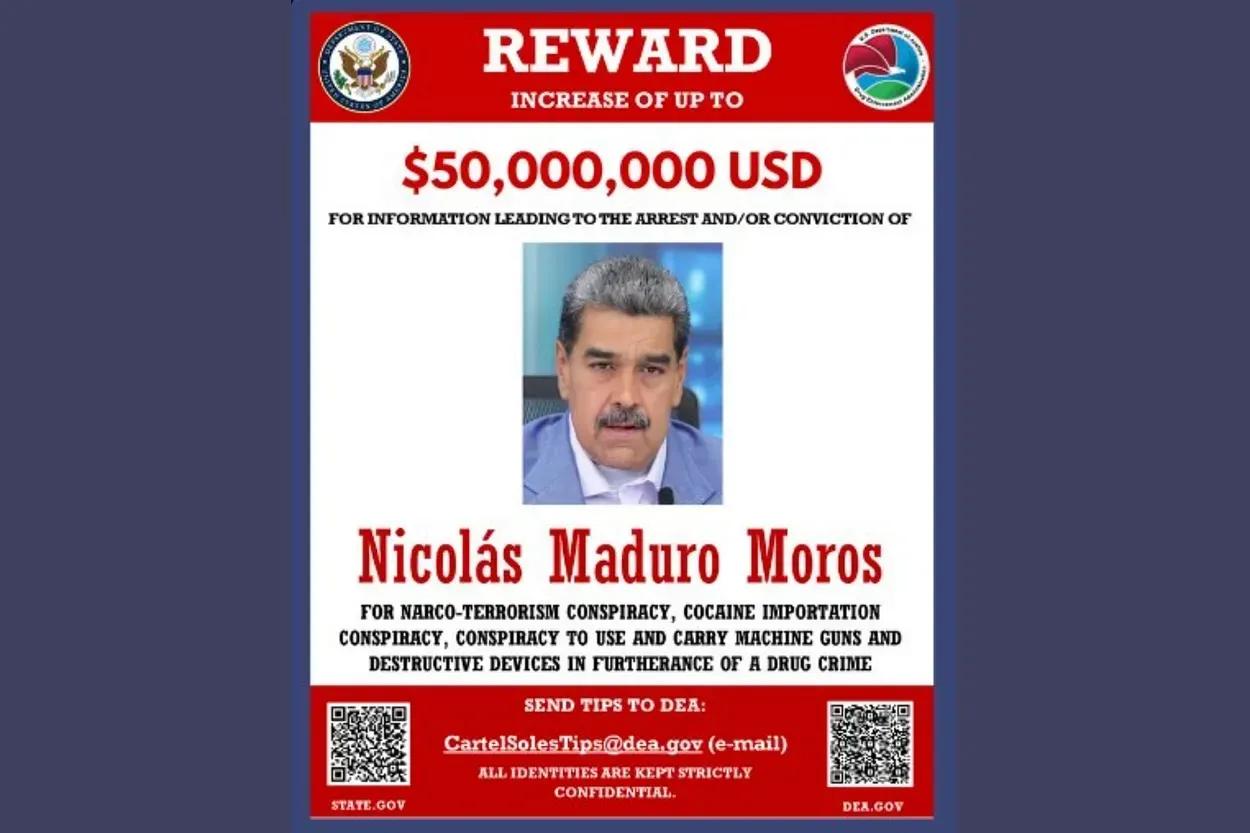Jesus Daniel Romero from the Miami Strategic Intelligence Institute for FinGurú
On July 31, 2025, U.S. Attorney General Pam Bondi publicly confirmed that the United States has increased the reward to $50 million for information leading to the capture of Venezuelan leader Nicolás Maduro. This is the highest reward ever offered for a foreign head of state. “We will not rest until he is brought to justice,” said Bondi, reaffirming the government's intention to hold Maduro accountable for narcoterrorism, transnational crime, and human rights violations (Western Journal, 2025).
This follows the designation on July 25, 2025, of the Cartel of the Suns as a specially designated global terrorist organization (SDGT) by the U.S. Department of the Treasury. The designation acknowledges that this criminal network does not operate from the shadows but from within the Venezuelan state itself, under military protection and political direction.
Secretary of State Marco Rubio added that the United States is prepared to use “all available resources, including military,” to neutralize the cartel threat. “This is not just a law enforcement issue. It is a national security matter,” Rubio stated (Rubio, 2025).
A New Era of State Terrorism
The Cartel of the Suns is not a conventional criminal organization. It is embedded within the institutions of the Venezuelan state. Under the command of Maduro and Diosdado Cabello, the regime has used state aircraft, diplomatic channels, and oil resources to protect and expand cocaine corridors stretching through Zulia, Apure, and Catatumbo. These routes have fueled criminal alliances with groups such as Hezbollah, the Sinaloa Cartel, and the Tren de Aragua.
In Final Flight: Queen of Air, I document how these drug trafficking flights were supported by state aviation authorities and corrupt export licenses. Aircraft registered to legitimate U.S. companies—like those controlled by Debra Lynn Mercer-Erwin—were diverted by Venezuelan-controlled brokers and used for drug transport. Mercer-Erwin was charged by the U.S. Department of Justice in 2020 for her involvement in trafficking, money laundering, and facilitating cocaine shipments through aircraft registration fraud.
Presidential Powers Under Title 50
The legal framework supporting these actions is based on Title 50 of the United States Code, which governs national defense and intelligence operations. Its invocation indicates that Venezuela is no longer treated as a political adversary but as a terrorist threat to U.S. national security (U.S. Code, n.d.).
Title 50 authorizes the president to take the following actions:
1. Mobilize Covert Action Authorities
Intelligence agencies like the CIA can carry out operations without prior Congressional approval, including sabotage, surveillance, and neutralization of cartel infrastructure.
2. Invoke Emergency Economic Powers (IEEPA)
Financial sanctions can be imposed to freeze assets, restrict transactions, and block access to international systems for individuals or entities affiliated with Maduro's regime or the cartel.
3. Coordinate Defense and Intelligence Resources
Defense Department operations can align with intelligence objectives for surveillance, interdiction, and covert support to regional partners.
4. Authorize Military Operations in Support of Counterterrorism
U.S. armed forces can be deployed under Title 50 mandates to intercept trafficking or terrorism activities where conventional law enforcement cannot operate.
This legal framework has been previously applied against threats like al-Qaeda, ISIS, and the Quds Force of Qassem Soleimani. Its application against Maduro represents a strategic escalation.
What’s Next?
The $50 million reward and the SDGT designation are not merely symbolic. They provide legal, operational, and diplomatic tools to confront the transformation of Venezuela into a criminal state. Title 50 allows the U.S. government to respond with the same urgency it has faced terrorist groups responsible for harming the homeland.
As I warned in Final Flight and in the upcoming book The Cartel of the Suns: A Criminal Trojan Horse, the criminal infrastructure of Maduro's regime has crossed borders. Its cocaine exports, financial alliances, and ties to terrorism now affect regional democracies, U.S. border security, and hemisphere stability.
Conclusion: A Strategic Turning Point
The actions taken by the Trump administration mark a clear break from previous U.S. policy. While in the past the focus was primarily on sanctions and diplomacy, this new approach directly attacks the core of the narco-state. The Cartel of the Suns has attacked the United States without firing a single bullet, sending hundreds of tons of cocaine to American cities and financing hostile actors.
For years, this was tolerated as a geopolitical nuisance. Today, it is treated as a terrorist threat. The U.S. has responded with its full legal and national security arsenal. The message is clear: criminal regimes will be treated as such and faced with firmness.
References (APA 7)
Rubio, M. [@marcorubio]. (2025, July 31). We will use every available resource, including military, to hold Maduro accountable [Tweet]. X. https://x.com/dnewsok/status/1953823318991069429?s=46
U.S. Code. (n.d.). Title 50 – War and National Defense. U.S. Government Publishing Office. https://www.law.cornell.edu/uscode/text/50
Western Journal. (2025, July 31). Pam Bondi offers $50 million reward for arrest of foreign president. https://www.westernjournal.com/pam-bondi-offers-50-million-reward-arrest-foreign-president/

Comments